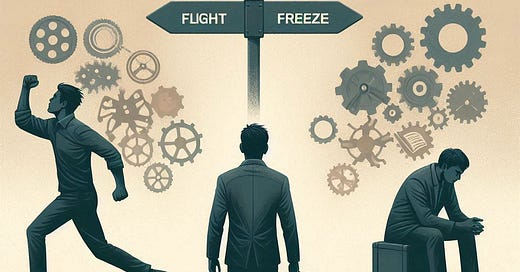When the Machine Goes Mad: On the Humanity of Systems and Flight as a Last Resort
A short reflection
If you're suffering and can't influence the system - leave it. This advice I've both given and received over the years. In a destructive relationship or at an unhealthy workplace, it can be vital. But what happens when it's the societal systems themselves that create division and confusion?
In social services, we meet people who have fallen between the cracks of systems. Those who have tried to navigate a Machine that sometimes seems to have lost its human compass. Rule conflicts where the right hand doesn't know what the left is doing. Kafka-esque situations where people are bounced between authorities without anyone taking responsibility for the whole.
When systems become mad - when they create more problems than they solve - we often see three reactions:
Fight - Those who have the energy try to influence from within. Write complaints, appeal decisions, engage politically. But it requires resources many lack.
Flight - Those who have the opportunity withdraw. Move, change systems, find loopholes. But flight is a privilege - it requires economic and social resources.
Freeze - Those who can neither fight nor flee. Here we often see illness, despair, sometimes suicide. When the Machine crushes and the human has nowhere to go.
This is the dark side of our welfare. When systems meant to support instead harm. When bureaucracy becomes so complex that even we who work within it don't understand the whole.
But here also lies the core of my exploration of Human and Machine. How do we build systems that retain their humanity even when formalized? How do we create structures robust enough to handle complexity but flexible enough to meet the human?
Part of the answer lies in acknowledging systems' potential for madness. Building in safety valves, appeal opportunities, and above all - space for human judgment and development. Systems that can acknowledge when they themselves have become the problem.
We can't all flee from society's systems as we can from a bad workplace. Therefore it becomes all the more important that those working within the systems - we who are part of the Machine - never forget our humanity. That we dare to see when our routines create more harm than good.
Ultimately, the balance between Human and Machine is about building systems that serve humanity, not the reverse. Systems with built-in humanity. For when flight isn't an option, the systems themselves must be humane.
A reflection on systems' responsibility when humans cannot flee.





